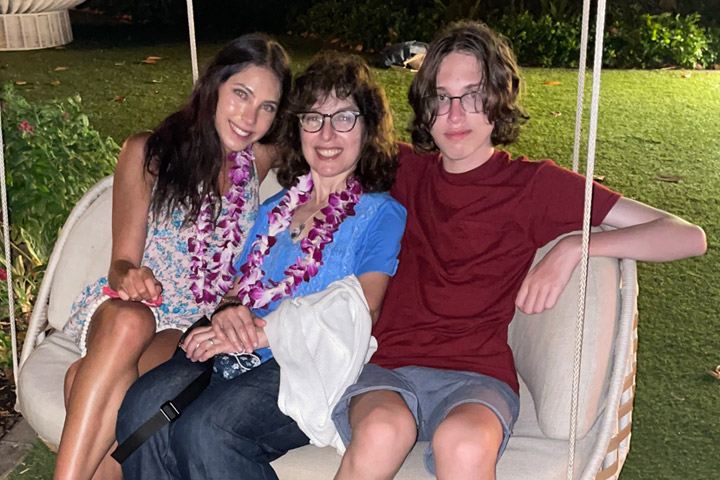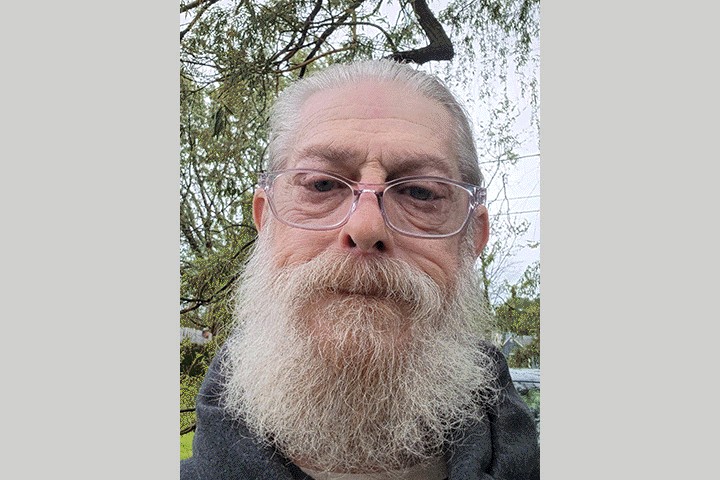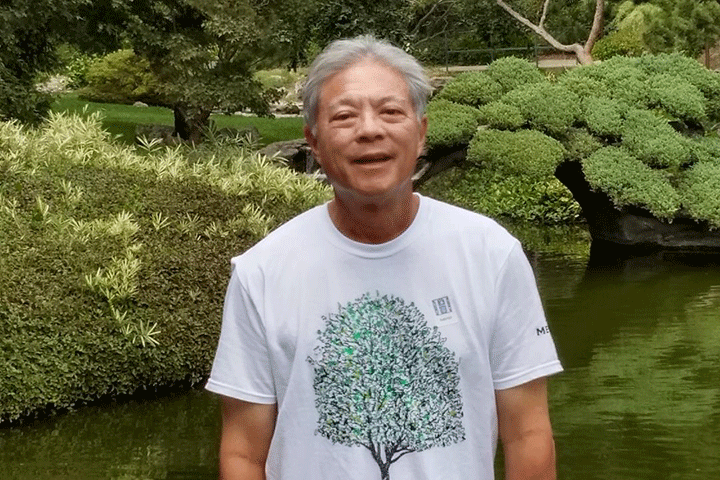Going Outside Standard Protocol Changed Everything

- Abdominal pain leads to stage IV diagnosis
- One attempted Whipple procedure; a second successful Whipple
- Surgical recovery during the pandemic
- No evidence of cancer in my body
I was determined to make it through my students’ choir concert despite the crippling pain in my abdomen.
Music and teaching were my life before pancreatic cancer turned everything upside down in November 2018. I taught music to hundreds of elementary school students at Archway Classical Academy Lincoln in Chandler, Arizona, hoping that they would love learning music as much as I loved teaching it. That Fall I had been experiencing extreme abdominal pain. I also started developing type 2 diabetes—both signs of pancreatic cancer that I did not recognize at the time.
I was hospitalized late in 2018 at Chandler Regional Hospital for the pain. I was transferred to Banner – University Medical Center (Phoenix), and there I underwent a series of endoscopies, ultrasounds, and CT scans until answers were found. There were numerous tumors in my abdomen, including one the size of a melon. The tumor was so large that it caused a blockage in my intestines and esophagus. The doctors had to put in a nasogastric tube and a stent to hold the main tumor back from my intestines.
I didn’t understand the gravity of everything happening to me at that point—I was sure I would be going back to work when all of this was over. But life kept throwing me for a loop.
The initial course of action was to have a Whipple procedure, which unfortunately did not go as planned. The cancer was too advanced and inoperable, so the surgeon didn’t complete it. Ultimately, I was given the diagnosis of stage IV pancreatic cancer, with four to six months to live.
My oncologist at Banner MD Anderson Cancer Center, (part of Banner – University Medical Center Phoenix) recommended seven months of aggressive chemotherapy. My doctors wanted to see if the tumors could shrink enough to decrease my pain, improve my quality of life, and extend the time I had left. Chemo would not cure my cancer and the treatment was considered palliative.
Shrinking Tumors Results in Unforeseen Complications
Within six months the tumors had shrunk and the amount of cancer in my body decreased. Smaller tumors meant my organs were shifting around within my abdomen. My stents slipped and migrated into my intestines, but as long as I could eat and function there was nothing the surgeon could do about it at that point. He suggested that I take a break from all treatments and get a CT scan every few months.
I was happy to take a break from the treatment, but I was still in pain and the chemo had caused me to develop neuropathy. I began seeing a palliative care doctor at Banner MD Anderson Gateway in Gilbert for the pain and an endocrinologist at MD Anderson Cancer Center Gateway for my diabetes. By early 2020 I was feeling better and was able to volunteer at my son’s school. Then the pandemic came along, throwing yet another curveball into my journey. But that wasn’t all….
My cancer was growing again, a tumor was blocking my stomach, and the stents remained in my intestines. My oncologist at University said that there was nothing more he could do for me. My surgeon felt that the cancer was still inoperable and that it was too risky to try to remove the stents. I needed to find another way forward.
My Brother-in-Law, My Medical Advocate
My brother-in-law, Dr. Richard Eisen, was on my tumor board at University. He acted as my medical advocate, advisor, and go-between with my doctors. Richard is a pathologist who works at Banner – University Medical Center and other Banner facilities. He has been a resource in many cancer cases at Yale New Haven Hospital and Greenwich Hospital in Connecticut. He and my oncologist referred me to a radiologist at MD Anderson Cancer Center Gateway in spring 2020 to see if I was a candidate for radiation. I wasn’t. The pancreatic cancer specialist at the same medical center said I should return to a regime of aggressive chemo or begin preparations for the cancer to progress, most likely by having a feeding tube placed inside of me.
Then came an unexpected turn. MD Anderson Cancer Center Gateway surgical oncologist Dr. Michael Choti suggested another Whipple procedure to remove the tumors. He viewed my diagnosis as an individual case and determined that stepping outside of the protocol was an appropriate and optimistic way forward. It would be a complicated nine-hour procedure. The caveat was that he might not be able to do anything once he got inside, which is what happened the last time. There was also the possibility that I might not survive the procedure at all. Still, there was a chance it could work. I decided that I might as well have him try.
A Second Whipple Procedure Gave Me a Second Chance
In April 2020, I had my second attempt at a Whipple procedure at Banner Gateway Medical Center. During the procedure, Dr. Choti removed all of the cancer, the head of my pancreas, my duodenum (a part of the small intestine), a portion of my bile duct, my gallbladder, and the associated lymph nodes. He also took out the wayward stents. It ended up being a life-saving and life-improving procedure for me, but there was still more work to do.
Recuperation in the hospital was both physically and mentally challenging. The pandemic was in full force so hospital staff was limited and visitors were not allowed. I had a lot of pain, but tolerated the operation well and eventually started eating and walking again. I began a course of radiation and oral chemo, which then limited my level of activity and hampered my ability to eat. It was a frustrating time for me and I was longing for good news.
Dr. Choti was just as shocked as I was to learn in fall 2020, only two years after my initial diagnosis and the first failed attempt at the Whipple procedure, that my body showed no evidence of cancer! I attributed this turnaround to all of my doctors who worked so well together and were respectful of each other; my surgical oncologist Dr. Choti, who was willing to step outside of the protocol for me; my amazing team of pharmacists; and my brother-in-law Richard for his advocacy, knowledge, and persistence.
Things will never go back to normal, but my life is better than I anticipated. I am not taking any oral chemotherapy and I feel good physically and mentally. I ended up developing type 1 diabetes and consequently wear an insulin pump and glucose monitor at all times. I am also chronically immunocompromised, which means I can’t return to my teaching job at the school. But I can still be a mom and do so many things with my husband Jody, my kids, and my friends. I walk a lot, ride my bike, and swim. Dr. Choti said I am free to live my life now and to go back to doing the things I want to do. I’m not sure what my next step will be, but we never thought I would be here today. Now I try to live in the moment.






